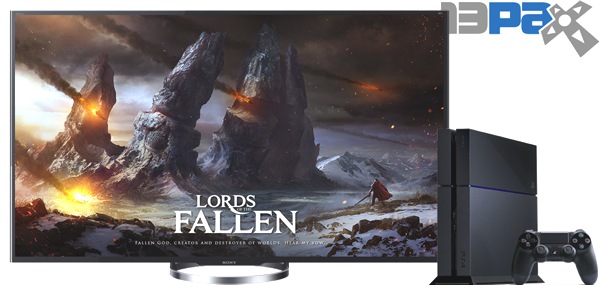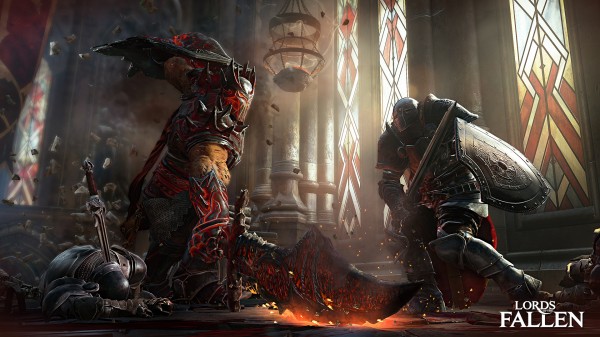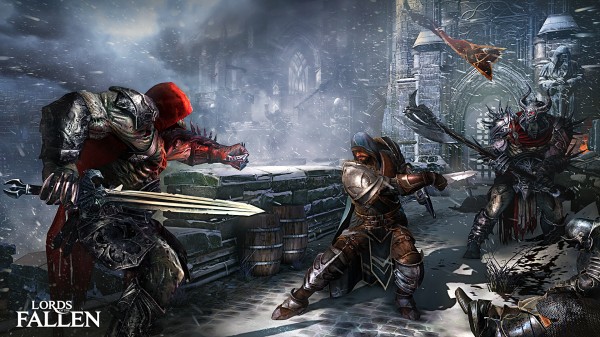
If you haven’t heard of Lords of the Fallen, an RPG from CI Games coming in 2014, don’t count yourself alone. Going into my hands-off preview of the game at PAX Prime, I didn’t know much about the game other than it would be coming to next-gen consoles and it had a pretty looking CG debut trailer. Sitting down with developers Deck 13 and watching their gameplay demonstration, Lords of the Fallen might be next-gen’s first good original RPG — will that be enough to fend off the likes of The Elder Scrolls Online and Dragon Age: Inquisition though?
Set in a fantasy world that worships a fallen god, the primary character in Lords of the Fallen is on a quest–as most good RPG heroes are–to stop the evil deity’s return. The fallen god of this game has been lost to myth and legend; 8,000 years prior to the start of the adventure, the people of this world had successfully fought and defeated their god, according to executive producer Tomasz Gop, one of the creators behind The Witcher and The Witcher 2. Gop explained that the warriors of this world drove the god and his armies under the earth, with only his massive hand reaching out of the ground a reminder of that long-ago victory. Lords of the Fallen begins with the return of those armies, a sign that the dangers of yore may be returning.
Harkyn, your playable character in Lords of the Fallen, is no avatar. Sure, you can decide his class, his skill set, you can upgrade his weapons and armor, and outfit him in the gear you choose. But this man has a story, a purpose, and a name. Harkyn is a “set, pre-defined character,” said Gop. “We wanted to build the story around him.” The demo begins with Harkyn and a companion entering an ancient monestary, and introduces the first of a series of different combat scenarios. Melee and magic power are at your ready, and the hand-to-hand was the focus of early situations. Button mashing is strongly discouraged, emphasizing a careful, methodical approach to adversaries. “Get in, deal a strike, and get out,” is the goal, explained Gop. “If you plan your strikes ahead, if you know the tools you have… it’s actually fun, because you’re becoming a skillful player.”

The second encounter was an early game boss fight against one of the Lords, for which the game bears its name. The Lords command the armies of the fallen god, and enter the world through massive tears in reality culminating in an explosive entrance. Battles with Lords begin to draw comparisons to Dark Souls in how Harkyn must combat these superior beings. Lords have patterns of attack, move sets that can be identified and used to the advantage of players who can dodge and react quickly. “We try to stage and phase boss fights,” Gop demonstrated as Harkyn wore down the heavily-armored Lord. Each “If we change something in a boss fight, it’s never going to get boring.” As the Lord’s health meter faded, parts of his armor would drop, and the enemy’s move set would change–becoming more aggressive the less protection he was afforded. The difficult level of boss fights was not downplayed by Gop, who remarked matter-of-factly “you might end up replaying this a few times… sometimes, bosses kill you.”
Magic attacks were the next focus of the demonstration, and Gop used this time to elaborate on the class system in Lords of the Fallen as well. “You can align yourself with types of supernatural powers and spells that sort of represent your playing style,” he explained, noting that Clerics may decide to use regenerative skills or projectiles, while Rogues would want to be stealthy, and Warriors would go berserk and rely on heavy magic attacks. While the magics skill trees are locked in at the beginning of your playthrough, everything else–including gear, stats, weapons, and shields–are class agnostic. “We wanted to make [magic abilities] feel very powerful,” said Gop. “We wanted to make them feel like something you can’t do yourself. They can give you an edge, they can give you a headstart in a fight… but you still have to be careful.” While they want to make tactical melee combat very “learning-oriented,” the team at Deck 13 hopes that magic skills will “look spectacular” and feel rewarding in terms of presentation.

The basis for Lords of the Fallen‘s presentation and graphics is a new proprietary engine built specifically for next-gen hardware created by CI Games and Deck 13. “We’ve built our own engine for this,” Gop explained, “not just because we want it to look cool, but so we can tweak any gameplay element to our liking.” The demo presented in our meeting is still based on pre-alpha code, with a lot of work still to be done, but the game already looks impressive. Gop also made sure we knew that this world, while not linear, was not the open world you might find in The Elder Scrolls or Dragon Age. “This is not a sandbox, this is not a Fallout kind of open world,” he stated. “We do encourage extra exploration and re-exploration; once you finish a certain chapter of a game and move on, it does not lock.” The monastery level in the demo, for example, of which only the ground floors were explored, could be unlocked once a player has learned new skills or found new equipment and access the large tower at the center of the complex.
Lords of the Fallen is currently scheduled for release in 2014 on PS4, PC, and that other next-gen console.
Discuss:
What do you want from a truly next-gen RPG?

You must be logged in to post a comment.